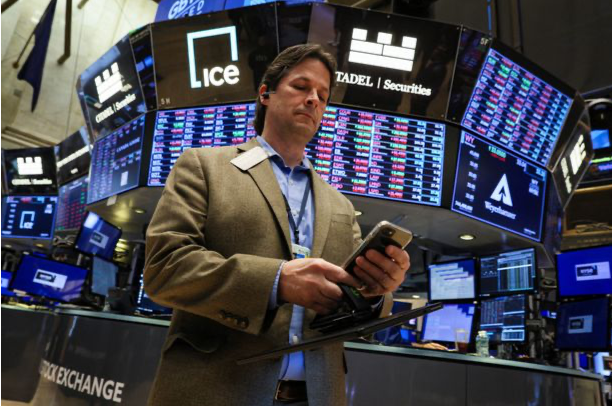By Alexander Lee

On June 23 (local time), a trader is working at the New York Stock Exchange (NYSE). /Reuters Yonhap News
"Larry Summers, the former US Treasury Secretary, sees a 60 to 40 possibility that the US will fall into a structural long-term recession or not."
"John Williams, president of the New York Federal Reserve, believes that the US growth rate will be 1-1.5% this year. This is not a recession, but the necessary economic slowdown to lower inflation pressure."
Amid the US economy staggering with 41-year high inflation fears, a heated debate is happening over the economic outlook surrounding 'stagflation (inflation in a stagnant economy)' and 'slowflation (inflation in a slowing economy).' While it is commonly predicted that the high inflation situation will persist, there is a fierce battle over whether the US economy will fall into a recession or just slow down.
The size of the US economy has a significant impact on the global economy. Especially, the South Korean economy, which has a high dependence on exports, is greatly affected by the course of the US economy.
On June 28 (local time), the Conference Board, a US private economic research institution, announced that the June consumer confidence index dropped significantly to 98.7 from the previous month (103.2), falling below 100 for the first time in 16 months since February of last year when the COVID-19 pandemic had a significant impact. In this survey, the future economic expectation index for six months later dropped significantly from the previous month (73.7) to 66.4, hitting the lowest level since March 2013. As a result, the fear of economic recession was highlighted, including a 2.98% plunge in the Nasdaq index and all three major indices in the New York stock market falling on the day.
Typically, an economic recession refers to a situation where the economic growth rate is negative for two consecutive quarters. Already in the first quarter of this year, the US growth rate was -0.4% (annualized -1.5%). If the second quarter also records negative growth, it can be considered to have entered an official recession phase.
Cathie Wood, CEO of ARK Invest, who is nicknamed "Money Tree Sister" in Korea, said, "It seems that we are already in a recession. In my 45-year investment career, I have never seen such a large inventory buildup as nowadays." The only times the US has experienced two or more quarters of negative growth since 2000 were during the global financial crisis (3Q 2008 to 2Q 2009) and the COVID-19 pandemic (1Q to 2Q 2020).
Senior officials of the US Federal Reserve System are actively refuting the possibility of stagflation and making great efforts to alleviate anxiety. Mary Daly, president of the San Francisco Federal Reserve Bank, said, "Although the unemployment rate will rise somewhat due to the interest rate hike, it is not expected to be as severe as a recession." James Bullard, president of the St. Louis Federal Reserve Bank, also said, "Raising interest rates to lower the inflation level can promote strong economic growth."
On this day, global investment bank UBS predicted that "the US economy will experience slowflation in the next 1-3 years." For the possibility of the US economy falling into a recession next year, Bank of America (BoA) saw 40%, JPMorgan 33%, and Goldman Sachs 30%, with most investment banks still seeing less than 50%. Recently, Bloomberg highlighted that "the US may not fall into a recession" by emphasizing the recovery trend in the US labor participation rate and consumer spending.
Reporter Alexander Lee
alexanderlee_24@newsyn.co.kr 
